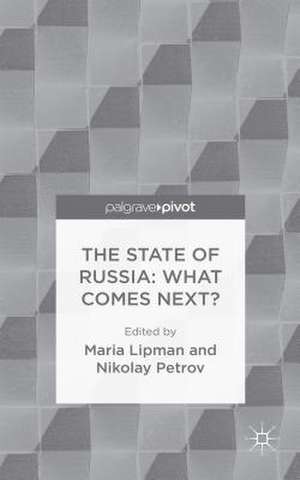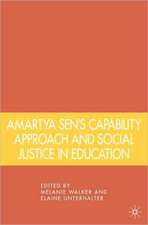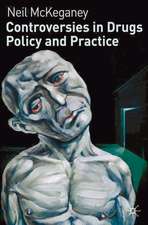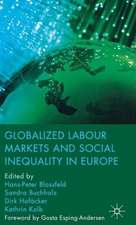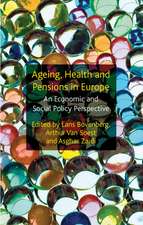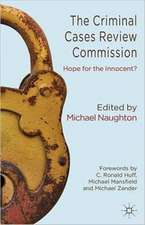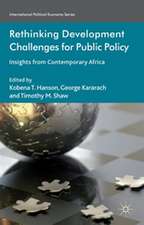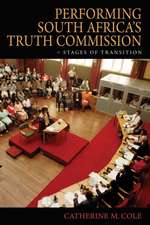The State of Russia: What Comes Next?
Editat de Nikolay Petrov, Maria Lipmanen Limba Engleză Hardback – 19 iul 2015
Preț: 385.62 lei
Nou
Puncte Express: 578
Preț estimativ în valută:
73.79€ • 78.91$ • 61.52£
73.79€ • 78.91$ • 61.52£
Carte tipărită la comandă
Livrare economică 18 aprilie-02 mai
Preluare comenzi: 021 569.72.76
Specificații
ISBN-13: 9781137548108
ISBN-10: 113754810X
Pagini: 157
Ilustrații: VIII, 157 p.
Dimensiuni: 140 x 216 x 13 mm
Greutate: 0.36 kg
Ediția:1st ed. 2015
Editura: Palgrave Macmillan UK
Colecția Palgrave Pivot
Locul publicării:London, United Kingdom
ISBN-10: 113754810X
Pagini: 157
Ilustrații: VIII, 157 p.
Dimensiuni: 140 x 216 x 13 mm
Greutate: 0.36 kg
Ediția:1st ed. 2015
Editura: Palgrave Macmillan UK
Colecția Palgrave Pivot
Locul publicării:London, United Kingdom
Cuprins
List of Charts and Tables
Note on Contributors
Introduction; Maria Lipman and Nikolay Petrov
1. Post-Crimean Political Order; Boris Makarenko
2. The Russian Economy at the Start of the Post-Putin Era; Sergey Aleksashenko
3. The Relations Between the Center and the Regions; Natalia Zubarevich
4. Russia Reinvents Itself as a Rogue State in the Ungovernable Multi-Polar World; Pavel Baev
5. Putin ' 's Relapse Into Totalitarianism; Lev Gudkov
6. Putin ' 's ' 'Besieged Fortress ' ' and Its Ideological Arms; Maria Lipman
7. Conclusions; Maria Lipman and Nikolay Petrov
Index
Note on Contributors
Introduction; Maria Lipman and Nikolay Petrov
1. Post-Crimean Political Order; Boris Makarenko
2. The Russian Economy at the Start of the Post-Putin Era; Sergey Aleksashenko
3. The Relations Between the Center and the Regions; Natalia Zubarevich
4. Russia Reinvents Itself as a Rogue State in the Ungovernable Multi-Polar World; Pavel Baev
5. Putin ' 's Relapse Into Totalitarianism; Lev Gudkov
6. Putin ' 's ' 'Besieged Fortress ' ' and Its Ideological Arms; Maria Lipman
7. Conclusions; Maria Lipman and Nikolay Petrov
Index
Recenzii
"This book thoroughly analyses the dramatic and disturbing changes Russia has seen in the past twelve months. The country has become sharply more authoritarian, more nationalist, and more hostile to the West. Only by understanding Russia can we respond intelligently to it. This book is an important contribution." - Sir Anthony Russell Brenton, KCMG, British Ambassador to Russia, 2004 08
"This brilliant - and concise - book by leading experts answers the two most important questions about Russia. Why did it take a dramatic and aggressive new course early in 2014? And what are the implications for the rest of the world? Vital reading for anyone seeking to understand Russia since the annexation of Crimea - and what might come next." - Neil Buckley, Eastern Europe Editor, Financial Times, UK
"At a time when understanding Russia's politics is more crucial than ever, this volume by some of the country's top analysts provides an invaluable guide to the complex changes afoot since the annexation of Crimea. A brilliant interpretation of a rapidly moving target." - Daniel Treisman, Professor of Political Science, University of California, Los Angeles, USA
"This brilliant - and concise - book by leading experts answers the two most important questions about Russia. Why did it take a dramatic and aggressive new course early in 2014? And what are the implications for the rest of the world? Vital reading for anyone seeking to understand Russia since the annexation of Crimea - and what might come next." - Neil Buckley, Eastern Europe Editor, Financial Times, UK
"At a time when understanding Russia's politics is more crucial than ever, this volume by some of the country's top analysts provides an invaluable guide to the complex changes afoot since the annexation of Crimea. A brilliant interpretation of a rapidly moving target." - Daniel Treisman, Professor of Political Science, University of California, Los Angeles, USA
Notă biografică
Sergey Aleksashenko, Visiting Scholar, Georgetown University, USAPavel Baev, Research Director and Research Professor, Peace Research Institute in Oslo (PRIO), NorwayLev Gudkov, Director of the Levada Center, Moscow, RussiaMaria Lipman, Visiting Fellow, European Council of Foreign Relations, London, UKBoris Makarenko, Chairman of the Board of the Center for Political Technologies, and Professor at the Higher School of Economics, RussiaNikolay Petrov, Professor and Laboratory Head, Laboratory for Regional Development Assessment Methods, Higher School of Economics, RussiaNatalia Zubarevich, Professor, Moscow State University and Director of the Regional Program, Independent Institute for Social Policy, Russia
